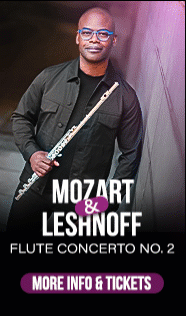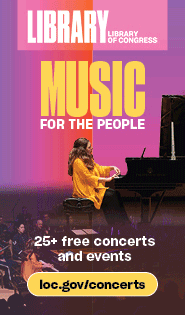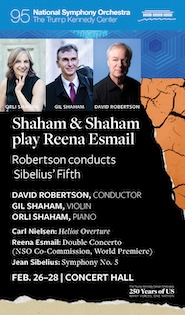Noseda closes his first NSO season with a Bach-centered evening

James Ehnes performed Berg’s Violin Concerto with Gianandrea Noseda and the National Symphony Orchestra Thursday night at the Kennedy Center. Photo: Tracey Salazar
Gianandrea Noseda is leading the last concerts of his inaugural season as music director of the National Symphony Orchestra this week. The program, centered around the theme of adaptations or citations of the music of Bach, was the sort of offbeat lineup he said he was striving for when he started last fall. Wanting “to challenge without shocking,” as he put it, he offered a meaty Brahms symphony with more recent music as a spicy accent.
The concert opened with Luciano Berio’s unorthodox arrangement of the final movement of Bach’s The Art of the Fugue. Bach did not specify instrumentation for this collection of pieces, but Berio opted for a large chamber ensemble, heavy on woodwinds, including the unexpected timbres of alto and tenor saxophone. With the five string parts also covered by single musicians, it felt like a piece more for the NSO’s associated chamber music group, the Kennedy Center Chamber Players.
The strangest feature of this version is that Berio did not assign single lines to one instrument or another. All the instruments fade in and out of the contrapuntal texture, as if an organist is changing registrations every bar or so. The ear follows a line only to have it evaporate and be picked up by another instrument. The woodwind playing dominated, with beautiful combinations of the four flutes, including alto flute and piccolo. The string sound, alas, was too often lost, here with principal violist Daniel Foster taking the second violin part.
Berio does not offer a completion of the work, left unfinished by Bach. The music trails off after Bach’s own name theme (B-flat, A, C, B-natural) is introduced as the final of three fugue subjects. Berio extends the final notes of the voices, beginning with the lowest. At first it sounds like a mistake, a ciphered pipe on an organ, but as other notes joined the cluster hanging in the air it formed its own sense of the infinite.
It was high time for the NSO to play Alban Berg’s sweetly dissonant Violin Concerto again, last heard under Leonard Slatkin in 2005. Berg dedicated the piece “To the memory of an angel,” none other than Manon Gropius, daughter of Alma Mahler and Walter Gropius, who had died of polio at age 18.
Canadian violinist James Ehnes played the role of Manon with unruffled serenity, sometimes swallowed up by the orchestra in more impetuous moments.
The strain occasionally affected the soloist’s intonation in the first movement, at extremities of the instrument. Ehnes hit his stride in the second movement, especially in the meditative cadenza, accompanied sometimes by his own left-hand pizzicati and sometimes by the violas. Berg quotes Bach’s harmonization of the chorale Es ist genug, a moment of beatific solemnity for the three clarinets and bass clarinet, a tune that overlaps with the tone row Berg uses in the piece.
One of the major disappointments of Christoph Eschenbach’s tenure with the NSO was his overheated interpretations of the Brahms symphonies.
Yet Noseda hit all the right marks in a blockbuster reading of the Fourth Symphony, which opened with the sighing main theme of the first movement soft and unhurried. The horn section was flawless in the exposed second movement, again with a leisurely pacing that smoldered with smoky melancholy.
The third movement is probably bright-eyed enough with its playful triangle part that there is no need for it to be quite as fast as Noseda took it. The playing was exciting and breathless, but the strings were not always in complete unity. The finale had a burly intensity, sparked by the addition of the three trombones.
Noseda completed the evening’s Bach circle here as Brahms based this passacaglia on a theme adapted from a Bach cantata, Nach dir, Herr, verlanget mich. The delicate parts of the movement were the most memorable, especially the silvery low range of principal flutist Aaron Goldman in an extended solo.
This Bach-centered program, with an eye to the eternal, made a fitting tribute to NSO violinist Hyun-Woo Kim, who passed away unexpectedly last week. The orchestra also honored five musicians who are retiring this season, including violist William Foster; violinists Holly Hamilton, Peter Haase, and Pam Hentges; and timpanist Charles Wilkinson.
The program will be repeated 8 p.m. Saturday, when it will also be broadcast live on the internet. kennedy-center.org; 202-467-4600




